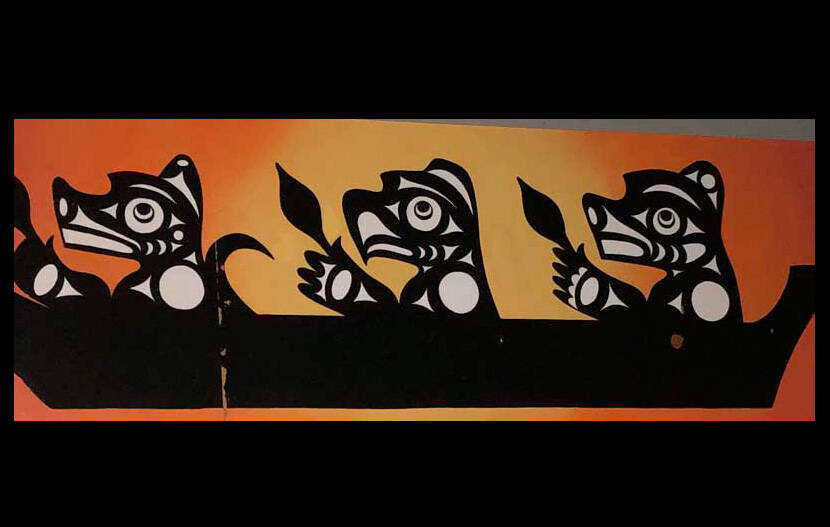By Morf Morford
Tacoma Daily Index
Port Townsend to Ketchikan
750 miles, limited resources, erratic communications, difficult conditions, intense currents, unpredictable weather, innumerable floating logs in the way, 30 foot wide whirlpools, ice, bears and endless rocks and waves, and impossibly remote areas, equipment failures and losses, and little in the way of emergency back up – to quote a common phrase, “What could go wrong?”
But “Why?” might be a better question.
There’s the prize money for the winner ($10,000) and the prize for second place (a set of steak knives), but mostly, it’s not so much bragging rights as a sense of putting your own muscle, wits and will against the immensity, power and perhaps even sheer indifference of nature in the name of human achievement that, for a time at least, inscribes purpose and meaning literally into the faces and muscles of those who attempt it.
“Gas is what we use in place of intelligence”
Or skill. Or as a barrier against the natural world and our place in it – and our vulnerability to nature’s slightest whims.
What happens when we face the world, at some of its most austere settings, armed only with what we have with no machinery to protect us? We have, to a large degree, bare – and undiluted existence.
Only about 500 people have attempted this race – since 2015. And it’s easy to see why. This race, though open to anyone, is certainly not appealing to everyone.
With boats of all sizes, shapes and materials, the first phase is the 40 miles from Port Townsend to Victoria, BC. The straits that separate Washington and British Columbia are among the busiest shipping lanes in the world, with unrelenting winds and strong currents – and the end of many of those who attempt the larger race.
With a combination of sails, pedals, oars and anything else human muscle-powered, these intrepid sailors and their (often handmade) structures make their way north. Nothing motorized is allowed to facilitate movement, but high tech communication and tracking (as in Coast Guard requirements) is essential.
How long does such a race take?
“A week and a half – give or take a week” was how one person put it. If you see the film, or even better, give it a try, you’ll see how true that is.
What kind of vehicle is required?
Basically anything that floats. And can survive indescribable abuse from the elements.
Rules
Besides a special kind of nerve/courage/stupidity, there are essentially no rules for this race.
As the FAQ page puts it “Bring a boat to Port Townsend, finish in Ketchikan, don’t have a motor, be self-supported along the way. Other than a single waypoint the route choice is yours.”
This is, to put it mildly, not your elitist regatta with multi-million dollar yachts and racing skiffs.
This is literally anything that floats from one-person paddle-boats to elaborate catamarans.
Obviously not everyone wins, but in how many races do many of the entrants not even finish?
Just a few of the life lessons learned here
Few stories are as compelling as humans up against nature – and against their own limitations.
But here are just a few observations that might apply to other areas of life;
Don’t row against the current.
Divide large, even incomprehensible, goals into smaller, manageable tasks.
If you have teammates, makes sure they help you get where you want to go.
Not every one wins, but sometimes just finishing is success enough.
Sometimes to do your best, you need to be stubborn, sometimes flexible and, as in this case, more than a little crazy. Sometimes quitting before you lose it all, is the best way to keep from losing it all.
Too many times, “easy” becomes boring.
And sometimes, doing what you never imagined doing – and those around you never though possible – is the most important thing you could ever do.
From the website: “The Race to Alaska documentary explores the extreme and impressive individuals who accepted this utterly unique challenge with jaw-dropping camera footage and a surprising amount of humor. From the quirky to the sublime, from Olympic athletes to high schoolers, the characters in this film show that there’s no one way to do the hardest thing you’ve ever done.” (r2ak.com/r2ak-faqs/)
You can see the film here;
June 3-5: Seattle, WA | SIFF Film Center
June 25 & 29: Tacoma, WA | The Grand Cinema
June 24-26: Ketchikan, AK | Coliseum Twin
The film just might inspire you to try the race next year. And if are suitably inspired, register here (r2ak.com/r2ak-race-application/).
And let me know. I just might join you.





